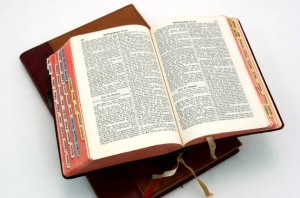When you read Lamentations 3:1-20, you can almost feel the sharp edge of God’s judgment. Through the blessed Instrument that we call “The Scriptures,” we can experience the dark emotions of a grieving man. As believers, we know that we are not under God’s wrath (Romans 5:9, 1 Thessalonians 1:10; 5:9). But each true believer is painfully aware of the rod of God’s correction (Hebrews 12:6).
In Jeremiah’s “Lamentations,” we have the opportunity to skillfully exercise our senses in the Word of righteousness (Hebrews 5:13-14). In essence, this gives us the opportunity to “pre-live life” and to pre-plan our obedience. In other words, the Scripture is a wonderful window through which we can clearly observe the varied sufferings of the saints. We can learn which sentiments are “in bounds” and which ones are “out of bounds.” We can understand how to glorify God and turn our impulsive hearts away from blasphemy. Then, w
Through the inspiration of the Spirit of God, “The Weeping Prophet,” Jeremiah described his dark emotions in Lamentations 3:1-20. When the city of Jerusalem was destroyed (by the Babylonians, 586 B.C.), Jeremiah testified that he had seen the affliction produced by the rod of God’s wrath (vs. 1). This is all the more remarkable because Jeremiah had predicted the devastation of this Chaldean invasion (Jeremiah 21:9; 22:25). Far from feeling vindicated (with an “I told you so” attitude), Jeremiah keenly felt the brunt of God’s judgment upon his nation. In words reminiscent of Jeremiah 20:7-9, Jeremiah testified about his feelings in Lamentations 3:1-20:
- He felt that God had led him into darkness and not into light (vs. 2).
- He felt that God had turned His hand against him, with the result that Jeremiah suffered very real, physical consequences (vs. 3-4).
- Jeremiah was totally surrounded by bitterness and trouble (vs.5).
- He sensed what is was like to be chained in deathly darkness (vs. 6-7).
- He knew the heartache of unanswered prayer in crooked places (vs. 8-9, c.f. Ecclesiastes 7:13) and what it was like to be savaged by suffering (vs. 10-13).
- He experienced the dark emotions which come to the surface when there is no human comforter (vs. 14), and misery is met with mockery.
- He felt the grating edge of bitterness, grinding him into brokenness (vs. 15-16).
- Jeremiah knew the sharp pangs of what it meant to be without peace and prosperity (vs. 17).
- In his sufferings, his sentiments screamed that he had no more strength and no more hope (vs. 18). It was as if the Lord had caused these to perish.
- For years afterward, whenever Jeremiah thought of this painful episode, it humbled him to remember his grieving misery and bitterness of heart (vs. 19-20).
My wife, Harriet, and I are wrestling with profound grief over the passing of two dear loved ones in the month of November, 2016. We have experienced some, if not all, of the dark emotions described by the weeping prophet. I was more than a little startled recently to discover that I had been grieving and weeping nearly every day this month!
All of these things help us to attach the greatest possible importance to the words of Lamentations 3:21:
“This I recall to my mind, therefore have I hope.”
If Jeremiah could still have hope when he was mired in these miseries, we need to know what he called to mind!
- God’s Loyal Love, 22-23
“It is of the LORD’S mercies that we are not consumed, because His compassions fail not. They are new every morning: great is Thy faithfulness.”
When it seems as if “the bottom falls out” of your life, you can take heart in this hope. Our God is full of great faithfulness to us. It is of the Lord’s mercies [Hebrews chesed – His steadfast, loyal love to us] that we are not consumed. We are not cast off forever (Lamentations 3:31).
His greatest mercy to us was in His sending the Messiah, the Lord Jesus Christ. By His finished work, His death, burial and resurrection, we have the confidence that we will not be consumed. When everything and everyone else fails, God’s faithfulness is unfailing. As people who are taught to number our days (Psalm 90:12), we can begin by counting on the fact that His mercies are new every morning. When you do this, pain can become a prayer prompter. In these verses, Jeremiah turned his knowledge about God into fellowship with God with personal worship: “Great is Thy Faithfulness.” What did Jeremiah call to mind?
- The Lord is my Portion, 24
“The LORD is my portion, saith my soul; therefore will I hope in Him.”
Even when we experience “total devastation,” we can know this with certainty: “The Lord is my portion.” Houses and lands and loved ones may pass away. Hope for an earthly inheritance may be gone. But we can take heart in the hope of Jabez (1 Chronicles 4:9-10). We also have a “house not made with hands, eternal in the heavens” (2 Corinthians 5:1). Through the wonder of the Word of God, I can reply to my sorrows; I can say this to my soul. I can guard and guide my heart with the words, “The Lord is my portion . . . therefore, I will hope in Him.”
- The Lord is good to those who wait upon Him. 25
“The LORD is good unto them that wait for him, to the soul that seeketh Him.”
Here is great faith in the great faithfulness of God. Here is the Biblical belief that God really exists and that “He is a rewarder of those that diligently seek Him” (Hebrews 11:6). Without this faith, it is impossible to please Him. But those who “wait for it” (Habakkuk 2:3), seeking Him and waiting for Him, will find that “The Lord is good!”
Pastor Gordon Dickson, Calvary Baptist Church, Findlay, Ohio



